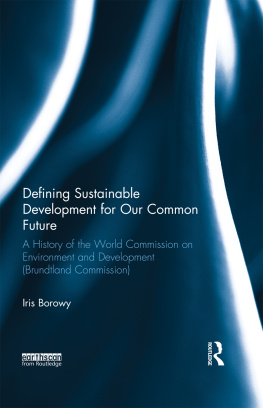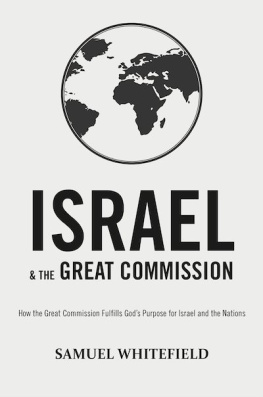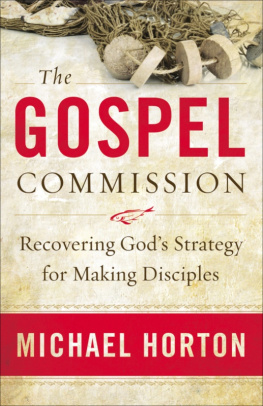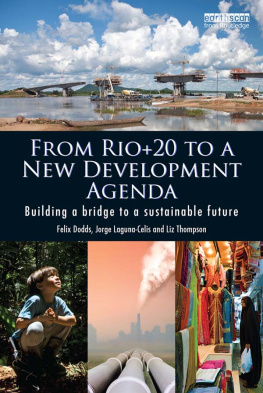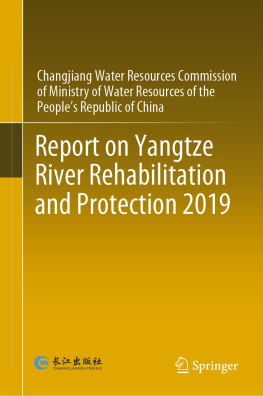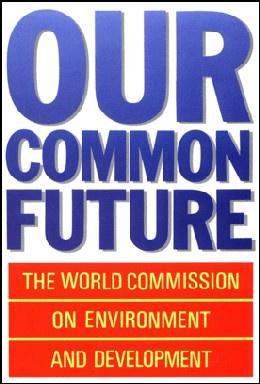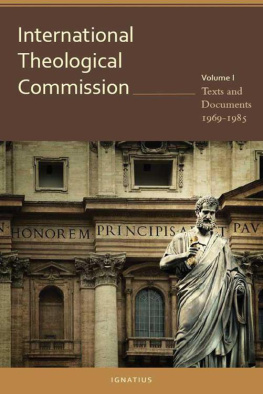DEFINING SUSTAINABLE DEVELOPMENT FOR OUR COMMON FUTURE
The UN World Commission on Environment and Development, chaired by former Norwegian Prime Minister Gro Harlem Brundtland, alerted the world to the urgency of making progress toward economic development that could be sustained without depleting natural resources or harming the environment. Written by an international group of politicians, civil servants and experts on the environment and development, the Brundtland Report changed sustainable development from a physical notion to one based on social, economic and environmental considerations.
This book positions the Brundtland Commission as a key event within a longer series of international reactions to pressing problems of global poverty and environmental degradation. It shows that its report, Our Common Future, published in 1987, covered much more than its definition of sustainable development as development that meets the needs of the present without compromising the ability of future generations to meet their own needs for which it became best known. It also addressed a long list of issues which remain unresolved today. The book explores how the work of the Commission juggled contradictory expectations and world views, which existed within the Commission and beyond, and drew on the concept of sustainable development as a way to reconcile profound differences. The result was both an immense success and disappointment. Coining an irresistibly simple definition enabled the Brundtland Commission to place sustainability firmly on the international agenda. This definition gained acceptability for a potentially divisive concept, but it also diverted attention from underlying demands for fundamental political and social changes.
Meanwhile, the central message of the Commission the need to make inconvenient sustainability considerations a part of global politics as much as of everyday life has been sidelined. The book thus assesses to what extent the Brundtland Commission represented an immense step forward or a missed opportunity.
Iris Borowy is an Adjunct Lecturer at the Historical Institute, University of Rostock, Germany and a Research Associate at the Centre Alexandre Koyr, CNRS, Paris, France.
Praised as a blueprint for a new era, despised as an oxymoron, classified as simple ecological modernization, seen as the greenwashing of Keynesian social-democracy, there is no doubt of the historical significance of the notion of Sustainable Development. In this instructive, well researched book, Iris Borowy disentangles the various strands. Highly recommended.
Joan Martnez-Alier, Professor of Economics and Economic History and Deputy Director of ICTA at the Universitat Autonoma de Barcelona, Spain
The Brundtland Commission is today often written off as either the dawn of a new era or as a massive failure. Its work is usually reduced to a single phrase sustainable development which, ironically, had its origins elsewhere. Iris Borowy gives us an eye-opening and very readable story of the commissions aims and achievements and its impact worldwide. Borowy has written a fascinating historical account of the international actors and their convictions, of ideas and interests, and the behind-the-scene struggles and debates that made the Brundtland report a landmark in political thought towards a better future.
Christof Mauch, Director, Rachel Carson Center for Environment and Society at LMU Munich and Past President, European Society for Environmental History
DEFINING SUSTAINABLE DEVELOPMENT FOR OUR COMMON FUTURE
A History of the World Commission on Environment and Development (Brundtland Commission)
Iris Borowy
First published 2014
by Routledge
2 Park Square, Milton Park, Abingdon, Oxon OX14 4RN
and by Routledge
711 Third Avenue, New York, NY 10017
Routledge is an imprint of the Taylor & Francis Group, an informa business
2014 Iris Borowy
The right of Iris Borowy to be identified as author of this work has been asserted by her in accordance with sections 77 and 78 of the Copyright, Designs and Patents Act 1988.
All rights reserved. No part of this book may be reprinted or reproduced or utilised in any form or by any electronic, mechanical, or other means, now known or hereafter invented, including photocopying and recording, or in any information storage or retrieval system, without permission in writing from the publishers.
Trademark notice: Product or corporate names may be trademarks or registered trademarks, and are used only for identification and explanation without intent to infringe.
British Library Cataloguing-in-Publication Data
A catalogue record for this book is available from the British Library
Library of Congress Cataloging-in-Publication Data
Borowy, Iris, 1962
Defining sustainable development for our common future : a history of the World Commission on Environment and Development (Brundtland Commission) / Iris Borowy.
pages cm
Includes bibliographical references and index.
1. World Commission on Environment and Development.
2. Sustainable development. 3.Environmental policy. I. Title.
HC79.E5B6643 2014
338.927dc23
2013021976
ISBN: 978-0-415-82550-4 (hbk)
ISBN: 978-0-203-38379-7 (ebk)
Typeset in Goudy
by HWA Text and Data Management, London
CONTENTS
PART I
The time before the WCED
PART II
The time of the WCED
PART III
The time after the WCED
When the Brundtland Commission first sat down together in Geneva in 1984, we were mostly strangers and treated each other with the gentle respect one would expect. Even so, first encounter or not, with a mandate covering both environment and development, we soon found ourselves in warm disagreement over a number of issues.
While our mutual respect continued and grew, that first meeting in Geneva was a love-in compared to the eight which followed, something that should come as no surprise to anyone who can recall the political climate prevailing during the Cold War world of the 1980s.
In this first-ever history of our work, Iris Borowy not only tells the story behind the UNs establishment of the Commission, chronicling the key events in its life and some of the more critical conflicts between major players, but she also describes the vigorous debates through which the concept of sustainable development and other principal ideas evolved, all the while capturing much of the excitement which marked our meetings and public hearings between Geneva and Tokyo. It is a fascinating book and a rewarding read for all of those interested in the events and ideas leading up to the 1992 Rio Earth Summit and the continuing global debate on the defining issues of our time.
As Secretary General, I was more intimately involved in the life and work of the Commission than anyone else but it was Dr Gro Harlem Brundtlands stature and skill as Chairman that was critical in guiding the Commissioners through many difficult moments, holding them together and achieving our ultimate consensus.
Moving the Commission from controversy to consensus was not easy. Although each of our 23 members (later 22: 12 from the South, 7 from the West and 3 from the East) served in a personal capacity, we represented almost every shade of ideology extant at that time and our national, cultural and group loyalties were very strong. We had been asked to tackle some of the most complex issues facing humankind, issues loaded with questions of power, equity and justice. In doing so, we strove to involve a broad range of outside actors from every part of the globe. It was a potent mix of people, issues, ideology and process and we had a built-in potential to blow ourselves apart. We did come close on a few occasions, as Iris Borowy points out. But in the end, after a final all-night session in Tokyo marked by serious drama, we managed to reach a full consensus both on a diagnosis of the issues confronting the world community and on an agenda for change, including some 350 proposals for policy and institutional reform to place the world on more secure pathways to a sustainable future.


